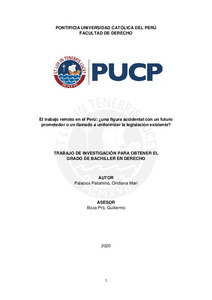| dc.contributor.advisor | Boza Pró, Guillermo Martín | |
| dc.contributor.author | Palacios Palomino, Oridiana Marí | |
| dc.date.accessioned | 2022-03-22T22:55:45Z | |
| dc.date.available | 2022-03-22T22:55:45Z | |
| dc.date.created | 2020 | |
| dc.date.issued | 2022-03-22 | |
| dc.identifier.uri | http://hdl.handle.net/20.500.12404/21865 | |
| dc.description.abstract | Ante el avance de la propagación del coronavirus (COVID-19), el 15 de marzo
del 2020 se publicó el Decreto de Urgencia 26-2020 que creó el “trabajo remoto”
como una de las medidas excepcionales y temporales para prevenirla. El objetivo
de este trabajo de investigación es analizar si debería optarse por reconocerlo
como una figura independiente con las modificaciones pertinentes o adherirlo a
una legislación general sobre el trabajo a distancia. Asimismo, como objetivos
específicos, primero, se busca establecer el panorama normativo del trabajo a
distancia vigente, mediante la comparación y búsqueda de desventajas/vacíos
de las normas preexistentes para determinar si el trabajo remoto ofrece una
solución novedosa o factible. Segundo, se determinan las implicancias actuales
y futuras mediante el mantenimiento de la figura actualmente estudiada. Para el
cumplimiento de tales objetivos, tomando como patrón la tipología de la Guía de
investigación de en Derecho de la CICAJ, la presente investigación se sitúa en
aquella de carácter dogmático o documental; mientras que su objeto de estudio
se centrará en la dogmática jurídica. La conclusión principal arriba a que el
trabajo remoto no regula un supuesto completamente novedoso, sino que se
suma a la legislación previa sobre el trabajo a distancia: trabajo a domicilio y
teletrabajo; perpetuando falencias previas y creando nuevas inconsistencias. De
esta forma, constituirlo como un modelo permanente, más allá del periodo
establecido originalmente, sería un retroceso en la implementación del trabajo a
distancia en el Perú. | es_ES |
| dc.description.abstract | Faced with the advance of the spread of the coronavirus (COVID-19), on March
15, 2020 was published the Emergency Decree 26-2020 that created "remote
working" as one of the exceptional and temporary measures to prevent it. The
aim of this research paper is to analyse whether remote working should be
recognised as an independent figure with appropriate modifications or adhered
to general legislation on distance work. In addition, as specific objectives, the first
objective is to establish the current regulatory framework for distance working, by
comparing and searching for disadvantages and pros in pre-existing laws to
determine whether remote working offers a novel or feasible solution. Second,
the current and future implications are determined by maintaining the figure
currently studied. In order to achieve these objectives, taking as a standard the
typology of the CICAJ Research Guide in Law, the present research is situated
in that of a dogmatic or documentary nature; while its object of study focuses on
the legal dogmatic. The main conclusion is remote working doesn’t regulate a
completely novel assumption, but adds to the previous legislation on distance
working: home working and telework; perpetuating previous shortcomings and
creating new inconsistencies. Thus, constituting it as a permanent model, beyond
the period originally established, would be a setback in the implementation of
distance working in Peru. | es_ES |
| dc.language.iso | spa | es_ES |
| dc.publisher | Pontificia Universidad Católica del Perú | es_ES |
| dc.rights | info:eu-repo/semantics/openAccess | es_ES |
| dc.rights.uri | http://creativecommons.org/licenses/by-nc-nd/2.5/pe/ | * |
| dc.subject | Trabajo virtual--Perú | es_ES |
| dc.subject | Trabajo a domicilio--Legislación--Perú | es_ES |
| dc.subject | Teletrabajo--Legislación--Perú | es_ES |
| dc.subject | Estado de emergencia--Perú | es_ES |
| dc.subject | COVID-19 (Enfermedad) | es_ES |
| dc.title | El trabajo remoto en el Perú: ¿una figura accidental con un futuro prometedor o un llamado a uniformizar la legislación existente? | es_ES |
| dc.type | info:eu-repo/semantics/bachelorThesis | es_ES |
| thesis.degree.name | Bachiller en Derecho | es_ES |
| thesis.degree.level | Bachillerato | es_ES |
| thesis.degree.grantor | Pontificia Universidad Católica del Perú. Facultad de Derecho. | es_ES |
| thesis.degree.discipline | Derecho | es_ES |
| renati.advisor.dni | 06286225 | |
| renati.advisor.orcid | https://orcid.org/0000-0002-3741-9062 | es_ES |
| renati.author.dni | 74711437 | |
| renati.discipline | 421016 | es_ES |
| renati.level | https://purl.org/pe-repo/renati/level#bachiller | es_ES |
| renati.type | https://purl.org/pe-repo/renati/type#trabajoDeInvestigacion | es_ES |
| dc.publisher.country | PE | es_ES |
| dc.subject.ocde | https://purl.org/pe-repo/ocde/ford#5.05.01 | es_ES |






